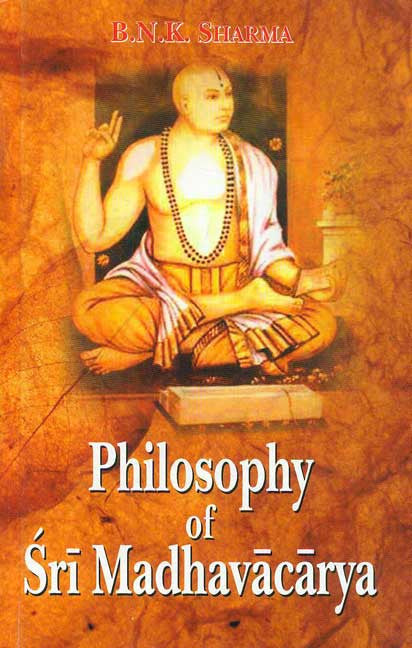Philosophy of Sri Madhavacarya
![]() 100% Genuine New Books
100% Genuine New Books
![]() Fast Shipping with Tracking Number
Fast Shipping with Tracking Number
Secure Payments via UPI, Cards & Wallets
![]() Trusted Support & Easy Returns
Trusted Support & Easy Returns
Philosophy of Sri Madhavacarya - Hardcover is backordered and will ship as soon as it is back in stock.
ISBN : 9788120800687, 8120800680
Year of Publication : 2014
Edition : Latest Reprint
No. of Pages : 514
Language : Sanskrit & English
Condition : New
Publisher: Motilal Banarsidass Publishing House
Free shipping on orders over Rs. 249
Free shipping on orders over Rs. 249
We offer free shipping on orders above Rs. 249 in India. For orders below this threshold, a nominal shipping fee may apply, which will be clearly indicated during the checkout process.
How long will it take to receive my order?
How long will it take to receive my order?
The delivery time varies depending on your location. Generally, orders are processed and shipped within 1-3 business days. Once shipped, you can track and expect your order to arrive within 3-7 business days (the duration may vary depending on your location). For more information, please refer to our shipping policy.
Chat with a Real Person
Chat with a Real Person
WhatsApp chat is dedicated to assisting with after-sales queries regarding delivery, returns, and payments. Click below to initiate chat with us on WhatsApp:
[Bookstaa WhatsApp Chat].
For all other inquiries, please visit our customer support page or email us at support@bookstaa.com.
Couldn't load pickup availability
Description
Description
Sri Madhavacarya (1238-1317) was the historical founder of the Dvaita system, which is one of
the three principal schools of Vedanta. He was a native of Tulunadu in Karnataka. Pajakaksetra,
eight miles south-east of the modern town of Udipi, on the West coast of S. India, was the village of his birth. He lived seventynine years.
He appeared on the Indian philosohical scene after the systems of Sankara and Ramanuja had been well established. The reasons which led him to propound a new system of Vedanta were his doctrinal differences and ideological dissatisfaction with contemporary trends and schools of thought within and without Hinduism and particularly with the system of Sankara which was the dominant philosophy of the time. In spite of the Theistic revolt against Sankara led by Ramanuja, Madhva could not agree with him on many points of Theistic doctrine. So he felt called
upon to give a new lead in thought to his countrymen.
MadhavaÍs writings are characterized by extreme brevity of expression and compression of thought. They need the help of a very good commentary to be understood in their fulness of thought and depth of meaning and intention. His commentator Jayatirtha has infused into them the necessary amplitude of utterance and expansiveness of thought and wealth of details.
This book is to give a complete, copious, critical and comparative exposition of Sri Madhavacarya's system of philosophy, bringing out its logical strength and metaphysical consistency and satisfyingness. It is intended to be an organic presentation of the system in all its essential aspects. It differs from all the other works in the field, including Dasgupta's, in showing how the concepts and categories of Madhava's philosophical thought have been conceived and formulated and have been put into a coherent system and in what relation they stand to those of other allied and rival systems. It brings out the special significance and interconnections of Madhava's doctrines and the architectonic unity of his system in relation to its parts. The reader is enabled to see for himself and appreciate the precise value and significance of some of Madhava's distinctive contributions to the perennial problems of religion and philosophy-particularly 'Indian Philosophy', for doctrine of Saksi, Svatantra, Visesa, Savisesabheda and Creation as Paradhinavisesapti.
Not only is such a systematic and critical exposition of MadhavaÍs philosophical system called for, but it has long been overdue. Metaphysically, it embodies the most powerful and sustained refutation of Vedantic monism. It has produced front-rank thinkers like Madhava, Jayatirtha and Vyasatirtha. It has an extensive philosophical literature of rare philosophical penetration, in Sanskrit. It has become the living faith of a large section of the people living in present-day India.
The volume is a good presentation of the philosophy of Sri Madhvacarya, complete in its architectonic unity. The author probes its ontological and epistemological foundations, and critcally examines the structure erected on them. The discussion focuses on crucial doctrines of theism, and brings to light for the first time the striking parallelisms of thought between Madhva and his Western contemporary St. Thomas Aquinas. Light is also thrown on how Madhva and his commentators anticipated the views of modern philosophers like Spencer, Russell and Hobhouse on the nature of time, space and memory. The latest researches on Madhvacarya's role in the Vedantic Bhakti movement and his attempt to harmonize the Upanisadic texts on monism and dualism are substantially drawn upon.
About the Publisher

Motilal Banarsidass Publishing House (MLBD)
Motilal Banarsidass Publishing House, popularly known as MLBD, is one of the oldest and most prestigious publishing houses in India, established in 1903.
With over a century of legacy, MLBD has been at the forefront of publishing scholarly works in the fields of Indology, Sanskrit, philosophy, religion, spirituality, yoga, Buddhism, and Jainism.
Renowned for its authenticity and academic rigour, MLBD's books are trusted by researchers, scholars, and readers across the globe.
With more than 5,000 titles in circulation, MLBD continues to uphold its commitment to preserving and promoting India’s rich cultural and philosophical heritage.
Bookstaa is an authorized distributor of MLBD books, ensuring 100% genuine and original publications for our readers.

